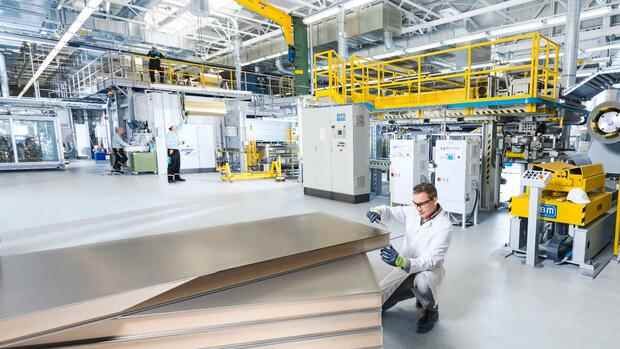Dusseldorf Two developments are forcing Covestro boss Markus Steilemann to take a radical step: he has to lower the plastics manufacturer’s profit forecast for 2022 for the second time within three months. Because energy costs are rising rapidly – and according to the CEO, the economic prospects are bleak.
“I think a recession in Europe is likely to be deeper and will last longer than before,” said Steilemann in an interview with the Handelsblatt. It refers, for example, to the financial crisis of 2008. At that time, the European economy got back on its feet after just a year after the severe Lehman shock.
The chemicals manager now expects long-term difficult times for Europeans in global competition, because of the expensive natural gas. “We have to adapt to energy prices that will sometimes be twice as high as in other regions in the long term,” says the Covestro boss. “As a result, industry in Europe will be structurally weakened.” Steilemann is also forecasting a recession for the USA, but this will be shorter.
With a view to an impending gas shortage in winter, Steilemann calls for the so-called extended operation of the remaining nuclear power plants in Germany – i.e. the continued operation of the reactors for a transitional period. A good consensus has certainly been reached in Germany with the phasing out of nuclear power. “But we have to face the realities and prepare for the winter. The federal government is well advised to take advantage of all opportunities to save gas, open to technology and free of ideologies,” says Steilemann. “Every watt counts.”
Top jobs of the day
Find the best jobs now and
be notified by email.
At Covestro itself, projects to reduce gas consumption have been underway for months. Generators for generating steam, which is important in the chemical industry, are converted to oil operation and production processes are revised. However, further major steps in saving energy are not possible without sacrificing production.
Each percentage point of lost production would reduce Covestro’s adjusted earnings (Ebitda) by a low to mid double-digit million amount. That would not endanger the group, in 2021 Ebitda was 3.1 billion euros. Above all, Steilemann warns of the macroeconomic consequences, because important plastics would then be missing in further processing. “The already strained supply chains would collapse.”
The Covestro Management Board has already included the consequences of a possible gas shortage for the company in the current forecast for 2022. The group expects an Ebitda of 1.7 to 2.2 billion euros. According to Steilemann, a gas shortage would hit the chemical company late. He doesn’t expect a complete failure anyway.
The chemicals manager expects permanently high energy prices in Europe.
(Photo: dpa)
This is partly due to the privileged location of the German Covestro production facilities. They are concentrated in NRW and Lower Saxony and are mainly supplied with gas from the North Sea. Technically, the German gas network hardly allows quantities to be forwarded from there to southern German industrial consumers who are dependent on Russian gas.
A failure of Russian gas supplies would only affect the Covestro plants in Belgium, France and Spain to a limited extent, analysts at Baader Bank expect. Locations in Asia and the US not at all.
But Covestro will have to pay significantly more for energy in the coming months. The company does not engage in hedging, in which companies secure fixed purchase prices for a longer period of time. Instead, the group buys on the spot market at current prices. According to Steilemann, this strategy worked well in many phases.
But now it is becoming apparent that Covestro’s energy costs will more than triple within two years. In 2020, the company still spent 600 million euros on electricity and gas worldwide. In the current year, the management expects energy costs of 2.2 billion euros – a good 300 million euros more than the last estimate three months ago, when Steilemann had to lower the forecast for the first time. Two-thirds of the renewed reduction is attributable to this effect.
Steilemann now wants to push green conversion
In the first half of the year, Covestro was still largely able to pass on the high energy and raw material prices to customers, who had to pay an average of 21 percent more for foams and transparent polycarbonate plastic. But Covestro expects pricing power to decline as the global economy cools.
However, Steilemann does not want to back down when it comes to the green conversion of the Leverkusen chemical company – on the contrary. “We will push the move away from fossil raw materials and energy sources against the background of the current crisis,” he says. In the long term, Covestro wants to only use renewable raw materials and electricity from green sources. The group is only at the beginning, but is now driving projects at many locations.
In Steilemann’s view, the industry as a whole should accelerate the transformation to green energy. Because one of her cornerstones has broken away: “The German economy has woken up from the dream that everything will just go on like this. Now we have to realize that our industry is based on importing cheap raw materials. But that is no longer the case.”
More: BASF raises annual targets – and trusts in its own systemic relevance when it comes to gas supply
